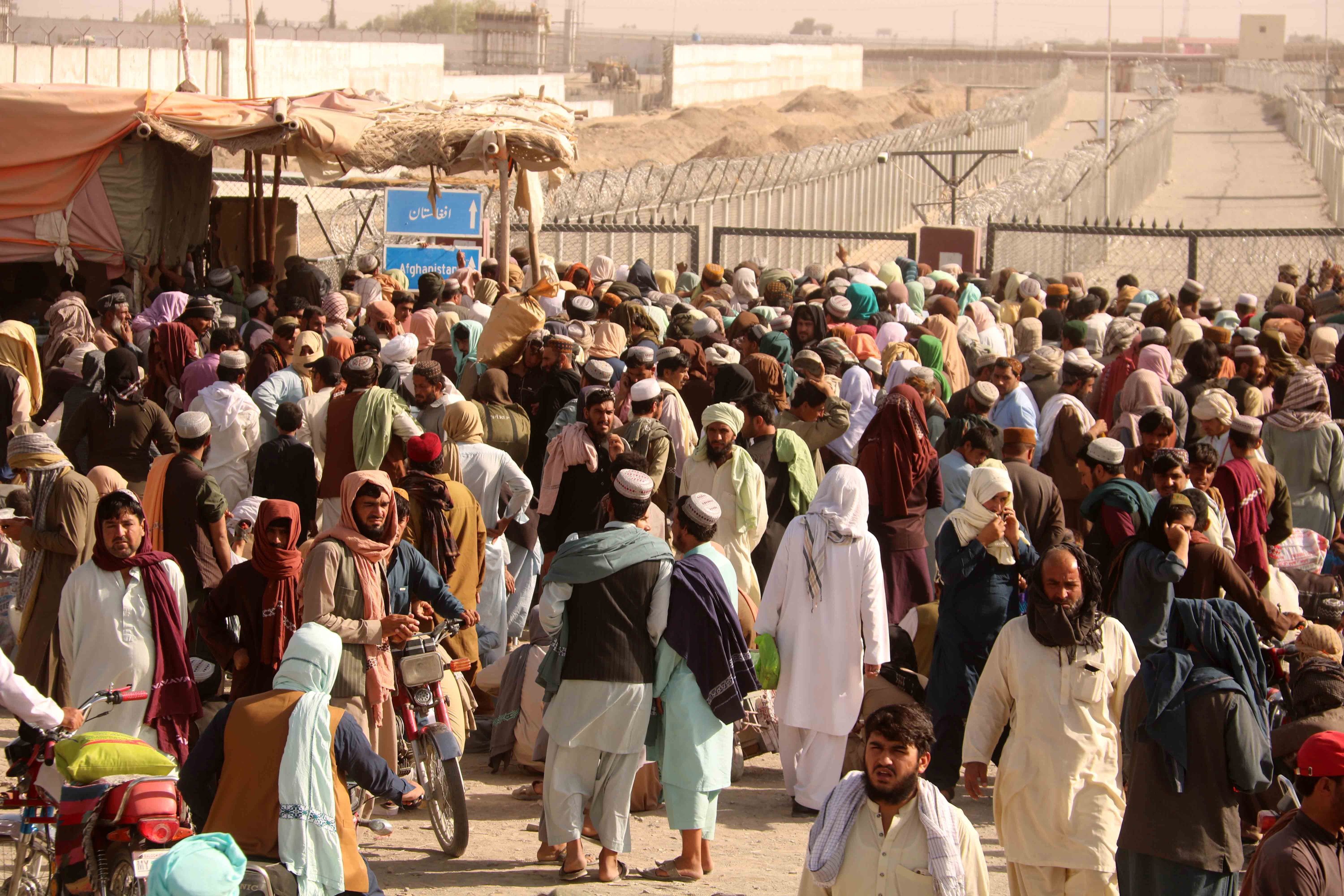
by Sara Nazir 28 October 2023
In the first week of October, Pakistani authorities announced a crackdown against illegal Afghan migrants as the government asked undocumented migrants to leave the country within a month or be expelled by the authorities. Some individuals among undocumented refugees have been linked to criminal activities within the country. In response to ongoing security concerns and the threat of terrorism, Pakistan has faced criticism from advocates supporting Internally Displaced Persons (IDPs). However, these so-called advocates chose to neglect the fact that the Pakistani government has only ordered the expulsion of migrants who continue to reside without proper documentation or have entered the country through illegal channels. This approach is aimed at upholding national security and enforcing immigration regulations while respecting the rights and protection of those who have genuine claims for asylum and refugee status.
In 1979, Pakistan opened its door to millions of Afghan refugees even though the country is neither a signatory to the United Nations Convention relating to the Status of Refugees (the Geneva Convention) nor the protocol relating to the Status of Refugees of 31 January 1967. Four million Afghan refugees, including 1.4 million unregistered and 0.8 million with Afghan citizen cards, have taken refuge in Pakistan in the last 40 years. Additionally, Pakistan welcomed 0.15 million Afghan asylum seekers after the United States’ withdrawal in August 2021, while 50,000 (mostly Hazaras) entered illegally. Out of these, approximately 55,000 are still present in Pakistan.
There are about 54 Afghan Refugee Camps operational in Pakistan, with 43 camps located in the Khyber Pakhtunkhwa province of Pakistan. About 68% of Afghan refugees live in urban areas, while only 32% live in camps relying on national public services. Despite several socio-economic and security challenges, Afghan refugees enjoy health, education, business, and trade rights in Pakistan. Refugees have free enrollment facilities in government primary schools and access to higher education with generous scholarships, free treatment in government hospitals, along with numerous livelihood opportunities. Many of these refugees run small businesses or take up jobs and send remittances to their family members across the border.
UN High Commissioner for Refugees, FilipoGrandi said, “Hosting refugees is a responsibility that has not been equitably shared. We pay tribute to the generosity of Pakistan for hosting millions of refugees for 40 years”.
Instead of acknowledging weaknesses in Afghanistan’s ability to tackle the issue, the Interim Afghanistan Government’s spokesman, Zabiullah Mujahid, responded to the report by saying that Pakistan, not Afghanistan, is responsible for the TTP’s concerns and we won’t permit them (the TTP) to use Afghan soil. Frequent terrorist assaults over the past two years, particularly in the regions of Baluchistan and Khyber Pakhtunkhwa (KP), show that the upsurge of terrorism in Pakistan is a direct outcome of vulnerabilities along its western border due to a lack of command and control mechanisms in Afghanistan. On the other hand, farther from the Pakistan-Afghanistan border, in Punjab and Sindh, there was a drop in violent occurrences. Despite the Islamic Emirates of Afghanistan’s claims that no militant outfit will be permitted to utilize Afghan land against a neighboring state, TTP has managed to find a vacuum in Afghanistan’s unstable state fabric.
In response to the recent spike in terrorist assaults in Pakistan, Foreign Minister of Pakistan Bilawal Bhutto Zardari said, “We would act under international law to defend ourselves. When we are continuously targeted in this manner and there is no acceptable response, we will be obliged to take this step if the Afghan authorities do not intervene. However, this should not be our first option.” According to Pakistan’s Chief of Army Staff (COAS) General Asim Munir, “Terrorism has no place in Pakistan and the involvement of Afghan nationals in terrorist incidents in Pakistan is detrimental to regional peace, stability and deviation from the Doha peace agreement by the interim Afghan government.”
Afghanistan must turn a page back in history and acknowledge that Pakistan took it upon itself to bring peace and stability in its brotherly country and mediated the talks between the Taliban and the United States. Furthermore, Pakistan has stood by Afghanistan through all kinds of hardships the country has faced, including providing rescue and relief during natural calamities. Since 2021 takeover of the Afghan Taliban in Kabul, Pakistan has appealed to the international community to give the new government a fair chance at proving its competence on numerous international forums. In Pakistan, Afghanistan has a valuable ally if it decides to make sincere efforts to uphold its promises to the country as well as the international community.
In addition to the international community’s criticism of Pakistan’s decision to deport illegal Afghan migrants, it’s crucial to consider the broader context within which Pakistan is operating. Pakistan, from the outset, extended a welcoming hand to Afghan migrants, but it also has a fundamental responsibility to ensure the security and stability of its own citizens. It’s worth noting that not every country would have been as accommodating as Pakistan in hosting illegal or undocumented migrants. While Pakistan showed empathy and compassion by initially welcoming the refugees, it’s essential to acknowledge that the situation has evolved, and security concerns cannot be overlooked. As a sovereign nation, Pakistan, like any other country, must prioritize its internal security and integrity. The deportation of illegal migrants may be a difficult decision, but it’s taken in the context of safeguarding its citizens and maintaining law and order. In evaluating Pakistan’s actions, it’s important to remember that national security is a critical consideration for any country, and the situation could have been handled differently by others if they were in a similar position.
